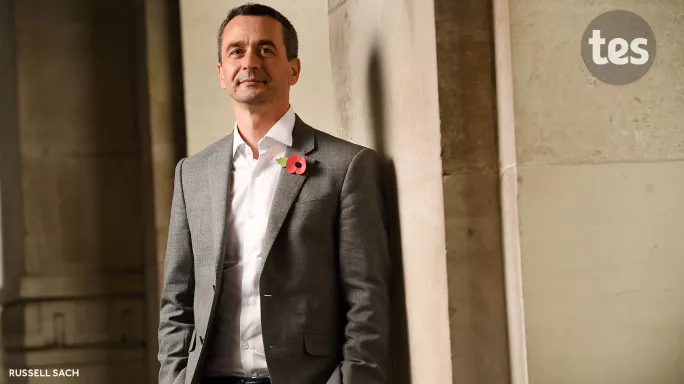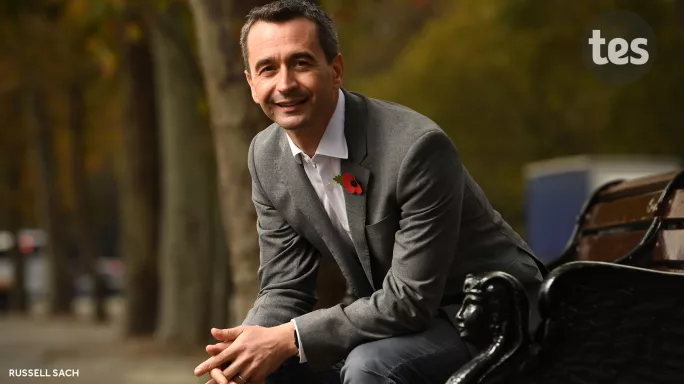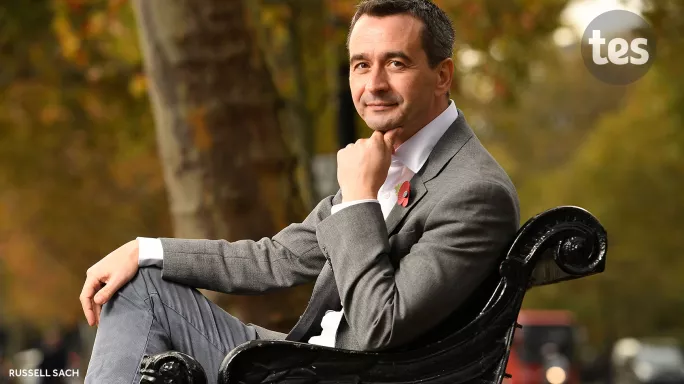
- Home
- Edexcel chief: ‘Don’t blame technology for exam leaks’
Edexcel chief: ‘Don’t blame technology for exam leaks’

If you have grown up with Ofsted inspectors at the dining table, then a career in the world of exams and assessment doesn’t seem like a huge leap.
“Education has always been part of my life and my family’s life - it’s probably a little bit in my blood,” says Derek Richardson, the Pearson vice-president who runs Edexcel, the UK’s largest exam board.
News: More ‘engaging’ texts added to English literature GCSE
Related: A-level maths cheats disqualified
Profile: ‘We know under-pressure teachers want a period of calm’
His mother trained as a teacher later in life, eventually becoming the head of a primary school. Richardson recalls education bigwigs visiting the family home for dinner, and his mother even involved him in lesson planning as a young teenager - he accompanied her to school to assemble displays.

However, it was not only the family connection with teaching that hinted at his future role. During one of his A levels, Richardson spotted a printing error on one of the papers. He was outraged that, while he and his peers had been slogging away at revision, the exam boards themselves could be so sloppy in comparison.
Throughout his interview with Tes, Richardson’s commitment to exacting standards becomes clear - he describes his recent time of “four hours nineteen seconds” for running a marathon as “annoying”. He also regularly completes obstacle endurance courses, as well as having taken part in the cycling event Ride London this year. Richardson was affected by cancer personally 15 years ago, and uses these events to fundraise for related causes.
Giving everybody a fair deal with exams
This sense of self-discipline may have contributed to his aggravation when it came to the careless error in his exam paper.
“It was a really small thing - I think it was like a missing full stop,” he says. “I remember distinctly feeling at that time, ‘How can that happen? Why was it not checked?’ That was the obvious question. That’s still with me now in all my work - thinking about how we can make sure things are right for students, to give everybody as fair a deal as possible when taking exams.”

This obligation to students is clearly at the heart of Richardson’s work, and he talks passionately about the ways in which Edexcel is trying to accommodate the needs of all candidates, especially those with special requirements.
For instance, when maths papers include questions on a cube, the board will produce a physical model of this shape, so that pupils can “have that tactile experience”. Technology, he argues, can help with this enormously - future science assessments could show candidates a video of a bubbling test-tube, which would have far more visual impact than a simple line drawing.
One of the things he most admires about Pearson is its global reach - on the afternoon of our interview, Richardson will be flying out to Uzbekistan to introduce vocational qualifications there. Another recent project has seen him work with the Egyptian government to launch on-screen national assessments for all pupils.
Technology in exams
He is a staunch advocate for the use of technology in exams, describing the pace of change in Egypt as impressive. It all sounds like a far cry from the rather Luddite methods employed by Edexcel to collate exam scripts back in 2003, before its buyout by Pearson.
“We used to wheel huge numbers of paper scripts around the University of London buildings - everything was face-to-face,” he says.
Richardson remembers, at the turn of the millennium, Ken Boston, chief executive of the Qualifications and Curriculum Authority, describing exam boards as being “a cottage industry”.
The paper-based system, he says, was something of a minefield - errant scripts would go astray, ending up in the wrong part of the country. For moderation, examiners would simply select three points from their stack of scripts at random, and mail these off into the void. Online marking, he says, has given boards much more oversight.
Richardson baulks at the idea that a greater reliance on tech can leave exam boards vulnerable to leaks and scandals of the kind seen this summer.

In August, the results of 78 students taking the Edexcel A-level maths paper were withheld after the entire paper was leaked on social media, and two people were arrested.
“I’m not sure technology contributed to that,” Richardson says, carefully. He feels people tend to focus on the negative consequences of technology (“and I’m quite a positive person”). He argues that social media simply allows for news of leaks to spread more freely, a symptom rather than the cause.
Overall, he feels that anxieties about tech may reflect the fact that, for most over-25s, the intricate workings of the web can still feel like something of a mystery.
“It’s right that people are concerned about the distractions of social media, and obviously the amount of screen-time people have can add to stress, so it’s got to be carefully managed. It’s all bite-sized, and there still needs to be time to have that longer depth of thinking,” he says.
But, Richardson adds, for younger generations, technology can feel like the most natural thing in the world. He points out that in the board’s student ambassador group - part of a move by Edexcel to combat the stress and anxiety of exams - young recruits were asking, “Where’s your Snapchat? Where’s the YouTube channel?”
“Because we didn’t grow up with digital when we were children, our experience will be very different to the next generation’s - they’re digital natives,” he says.
Diversity in exam scripts
Richardson points out that an area of concern for the sector is increasing the level of diversity in exam scripts. He says his interest in this may stem from his background in English literature - after studying for his BA at Teesside, he moved to Brighton to take up a master’s in cultural theory at Sussex University, exploring the impact that texts have on a wide range of readers.
Edexcel has recently expanded the range of works that students can study for GCSE English to include more authors from black and minority ethnic backgrounds. Richardson says that his own study of the subject was “wide-ranging”, and that while, “rightly, you have the representation of the historical canon”, exam boards should also reflect modern society.
He says pupils often ask him what they should study, and, in his view, exam boards are there to help people to follow their desired paths in life.
“I’ve got two nieces, and I think about the paths they’ve chosen - one of them did go down the academic route, and went off to university to study economics, and the other one actually followed a vocational route into health and social care, and that’s been what’s right for her,” he says.
“So I tend to think about my role as making sure that within the pathway of school there are the right opportunities for people to follow their strengths.”
Exam boards, he argues, are involved at fairly “pivotal, defining” moments in students’ lives. However, he feels that younger generations increasingly consider fluctuations in global politics when making some of their choices about what to learn.
“Things that are happening in the world really affect what students want to study,” he says, citing Greta Thunberg as a reason behind renewed interest in the sciences, and climate science in particular.
Talking to students
Richardson visits a wide range of schools and colleges to hear young people’s concerns directly. He says pupils now are far more aware of how interconnected the world can be, and he champions the idea of Pearson as a global brand.
As well as his various work trips, he enjoys travelling in his own time, and often visits Chicago, where his husband hails from; although, he says, the city’s famous deep-dish pizza is not as appetising as it sounds.
This desire to travel may stem from a rather peripatetic childhood. He was born in Nottingham and spent a few years on an army base in Germany as a child - his father worked for the civil service.
This was followed by a stint in Middlesbrough for his undergraduate degree, and then two years in Brighton for his master’s. This rather nomadic lifestyle may have given him a certain adaptability that helps in the rapidly changing world of education.
“Education doesn’t stay still for very long - my role is constantly shifting,” Richardson says. “When I first joined Edexcel, Curriculum 2000 was being introduced, and then about five years later GCSEs were reformed. And obviously, it’s been important for us to be involved in the recent reforms.”
As with many who work in exam boards, Richardson’s enthusiasm for learning is clear. In a tour of the building, he remarks that Pearson’s rather grand base, the Shell Mex building, also known as Eighty Strand, is the site of the first headquarters of the Royal Air Force. Today, the offices might be a hubbub of quick-fire, online meetings from across the globe, but once they would have been frequented by Winston Churchill.
And with that, he is off for his flight to Uzbekistan, ready to adapt to the next sea-change in assessment.
CV: Derek Richardson
- 1986-1993: GCSEs and A levels at Rushcliffe School, Nottingham
- 1993-1996: BA in English literature at University of Teesside
- 1997-1999: MA English literature, Sussex University
- 1997-1998: Customer service assistant at Trustee Savings Bank
- 1998-2000: Line instructor, American Express
- 2000-2001: Assessment coordinator, Edexcel
- 2001-2002: Administrative officer, London School of Economics
- 2002-2005: Assessment leader, Pearson
- 2005-2008: GCE operations manager, Pearson
- 2008-2013: Head of general qualifications assessment, Pearson
- 2013-2017: Director of qualification development, Pearson
- 2017-present: Vice-president of Pearson Edexcel
Register with Tes and you can read five free articles every month, plus you'll have access to our range of award-winning newsletters.
Keep reading for just £4.90 per month
You've reached your limit of free articles this month. Subscribe for £4.90 per month for three months and get:
- Unlimited access to all Tes magazine content
- Exclusive subscriber-only stories
- Award-winning email newsletters
You've reached your limit of free articles this month. Subscribe for £4.90 per month for three months and get:
- Unlimited access to all Tes magazine content
- Exclusive subscriber-only stories
- Award-winning email newsletters



